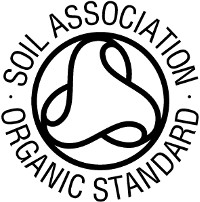The Soil Association
 The Soil association is a charity organisation founded in 1946 by a group of people who understood the connection between farming practices and the health of humans, animals and the environment. It is now the UK’s biggest charity campaigning for healthy, humane and sustainable food, farming and land use. The Soil Association inspects organic farms and businesses and awards certification based on certain standards it has put in place.
The Soil association is a charity organisation founded in 1946 by a group of people who understood the connection between farming practices and the health of humans, animals and the environment. It is now the UK’s biggest charity campaigning for healthy, humane and sustainable food, farming and land use. The Soil Association inspects organic farms and businesses and awards certification based on certain standards it has put in place.
Organic Crops
If you’ve read our post about organic September then you should already know what organic means and you can probably skip this next part. Farmers who grow organic produce don’t use any pesticides to help their crops grow, instead relying on composted farm manure and green waste to encourage growth because pesticides release harmful toxins in the air and leave a chemical residue on crops. It’s much better for the environment if we stop using pesticides because they contribute to the death of beneficial insects and are seen as the number one cause for the declining bee population. Organic farmers also use crop rotations, encourage hedgerows, windbreaks and smaller fields to reduce the problem of soil erosion.
Organic Animals
For organic livestock the standards dictate that the animals must have access to fields when the weather permits to be able to roam as freely as possible with plenty of space and they must be fed a diet that is as natural as possible, excluding any and all genetically modified organisms. In addition the animals can only be given drugs to prevent illness rather than routinely given antibiotics, and they absolutely cannot be given hormones which speed up growth or make them more products. Finally organic animals must not be produced from clones animals, the conditions of their natural life must be imitated as best possible.

Organic Fashion
It’s not just food that can be certified organic, clothes and textiles are also becoming more popular with organic cotton and organic wool now available. The Soil Association certifies to the Global Organic Textile Standards (GOTS), checking that the production of the fibre on a farm and the processing of the fibre into textiles meets organic standards and has been checked for social and environmental responsibility. Organic textiles use fibres grown without pesticides, and there are no harmful chemicals in organic textile production which is better for local wildlife and people. The social conditions in organic textile factories are much higher than others, and organic cotton production can help farmers find a way out of poverty. Have a look at this infographic to better understand organic textiles.
Organic Beauty
The Soil Association along with four other European certification bodies have developed the Cosmetics Organic Standard (COSMOS-standard) in an attempt to match organic standards for beauty products worldwide. In order get the certification, 95% of the products agro-ingredients and 20% of the entire product must be organic, while the remaining ingredients must meet strict criteria to make sure they are not harmful to our health or our planet. While products with 70-95% organic agro-ingredients can be certified, the Soil Association will not allow it to claim to be organic, the product can only state what percentage of its ingredients are organic, products that are labelled will use non-organic ingredients only because an organic alternative is not available, and the ingredient must also be GM free.

Certification
To gain certification, a farm of business is inspected by the Soil Association Certification and must meet the strict standards put in place, which you can read more about here, which ensure customers will be buying products that are genuinely organic. The standards set by the Soil Association exceed the UK Government’s minimum requirements and they have developed standards for areas not yet covered by government or EU regulations. There is a fee involved when applying for certification, and in some cases smaller businesses may not be able to afford it so when you see a product claiming to be organic without a certification don’t assume that it is lying!
Have a look at our fantastic range of both Soil Association Certified and non-certified organic products, and tell us what you love to use!



